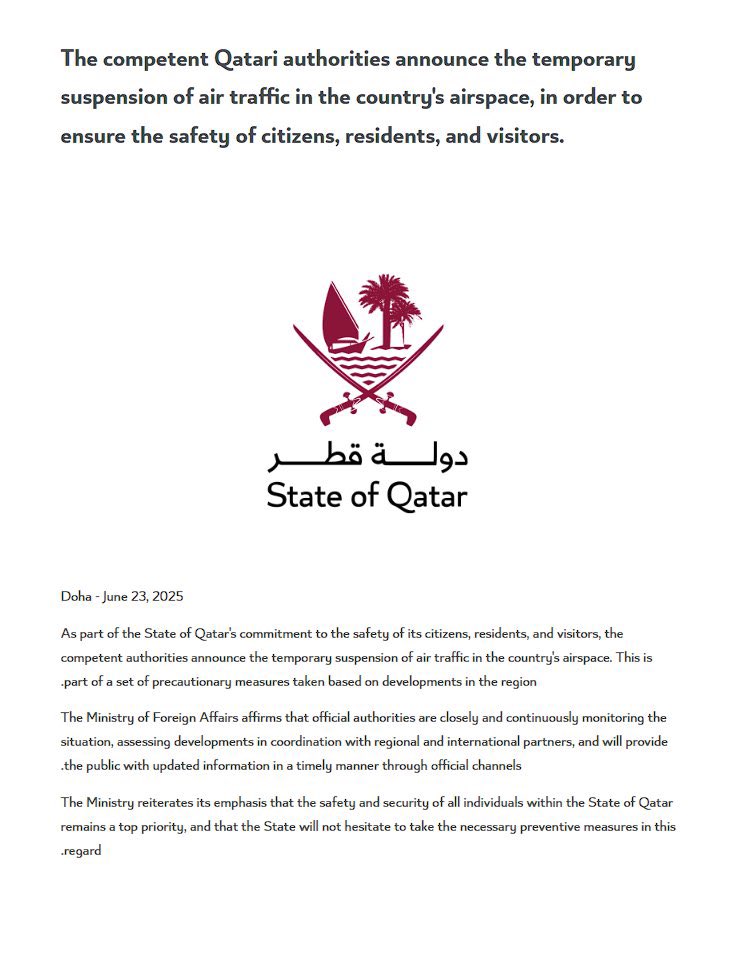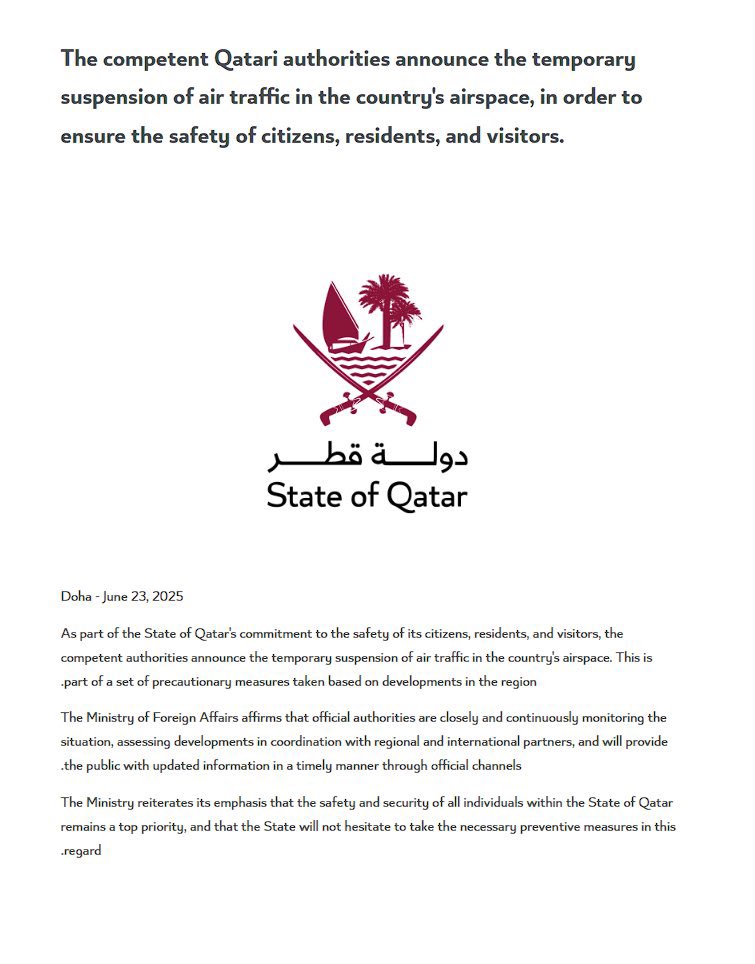Qatar Shuts Airspace: U.S. and U.K. Citizens Ordered to Shelter!
Qatar Closes Airspace Amid Escalating Iran-Israel Conflict
In a significant development, Qatar has announced the closure of its airspace in response to the intensifying conflict between Iran and Israel. This decision follows a series of warnings issued by the U.S. and U.K. embassies in Qatar, advising their citizens to "shelter in place until further notice." The alerts, circulated on June 23, 2025, underscore the heightened tensions in the region and the potential risks to international travelers and residents alike.
Background of the Iran-Israel Conflict
The Iran-Israel conflict has persisted for decades, rooted in ideological differences and geopolitical interests. Iran, with its nuclear ambitions and support for militant groups opposed to Israel, has consistently been a thorn in the side of the Israeli state. On the other hand, Israel views Iran as a primary threat to its security and sovereignty. The escalation of hostilities has led to various military confrontations, cyberattacks, and proxy wars across the Middle East.
Recent Developments
The recent escalation can be traced back to a series of provocative actions by both nations. Reports indicate that Iran has increased its military presence in Syria and has continued to supply arms to groups like Hezbollah, which poses a direct threat to Israel. In retaliation, Israel has conducted airstrikes against Iranian targets in Syria and has targeted weapon shipments intended for Hezbollah.
The situation took a dramatic turn when a series of exchanges between the two nations resulted in civilian casualties and heightened tensions in the region. The international community has expressed concern over the potential for a larger conflict, prompting various nations to reassess their diplomatic and security positions.
- YOU MAY ALSO LIKE TO WATCH THIS TRENDING STORY ON YOUTUBE. Waverly Hills Hospital's Horror Story: The Most Haunted Room 502
Qatar’s Role in the Conflict
As a key player in the Middle East, Qatar’s decision to close its airspace carries significant implications. Qatar has maintained a delicate balance, acting as a mediator in various regional conflicts while also hosting a U.S. military base that serves as a strategic asset in the region. The closure of airspace not only reflects Qatar’s response to the escalating conflict but also highlights its commitment to ensuring the safety of foreign nationals within its borders.
The U.S. and U.K. embassies’ warnings further emphasize the urgency of the situation, as they encourage their citizens to remain vigilant and prioritize their safety. The alerts serve as a reminder of the potential dangers that can arise in times of geopolitical instability.
Implications for Travelers
For travelers, the closure of Qatar’s airspace poses significant challenges. Airlines may need to reroute flights, leading to delays and cancellations. Passengers are advised to check with their airlines for the latest updates regarding their travel plans. Additionally, those currently in Qatar should heed the advice of their respective embassies and remain indoors until the situation stabilizes.
The closure of airspace also raises questions about the broader impact on regional air travel. With multiple countries in the area affected by the conflict, disruptions in air traffic may extend beyond Qatar, impacting travel plans for many individuals across the Middle East.
The Role of Social Media in Reporting
The announcement regarding Qatar’s airspace closure was disseminated through social media platforms, highlighting the role of digital communication in contemporary news reporting. Twitter, in particular, has become a vital source for breaking news updates, allowing users to rapidly share information and stay informed about evolving situations.
Aditya Raj Kaul’s tweet, which included a visual representation of the announcement, exemplifies how social media can facilitate real-time updates and foster awareness about critical events. As the situation unfolds, social media will likely continue to play a crucial role in disseminating information and providing a platform for discussions surrounding the conflict.
Conclusion
The closure of Qatar’s airspace amid the escalating Iran-Israel conflict marks a significant moment in Middle Eastern geopolitics. As the situation develops, it is essential for travelers and residents to stay informed and heed the advice of authorities. The implications of this conflict extend beyond the immediate region, affecting international relations and the safety of citizens abroad.
As tensions rise, the global community watches closely, hoping for a resolution that will restore stability to the region. The role of diplomatic efforts and mediation cannot be understated, as nations work together to navigate the complexities of the ongoing crisis. For now, individuals in Qatar and surrounding areas must remain vigilant and prepared for any further developments in this critical situation.

#BREAKING: Qatar closes airspace amid escalating Iran-Israel Conflict. Earlier today U.S. and U.K. Embassies in Qatar had warned American and British citizens to “shelter in place until further notice” in a June 23 alert. pic.twitter.com/BJJI4HRcIW
— Aditya Raj Kaul (@AdityaRajKaul) June 23, 2025
BREAKING: Qatar Closes Airspace Amid Escalating Iran-Israel Conflict
In a significant development, Qatar has announced the closure of its airspace, a move that comes as tensions rise between Iran and Israel. This escalation has caught the attention of governments around the world, prompting both the U.S. and U.K. embassies in Qatar to issue warnings to their citizens. On June 23, a precautionary alert advised American and British nationals to “shelter in place until further notice,” highlighting the seriousness of the situation.
What Led to This Airspace Closure?
The conflict between Iran and Israel has been simmering for years, with recent events intensifying the situation. The Iranian regime has been increasingly vocal about its opposition to Israel, and retaliatory actions have become more frequent. The airspace closure in Qatar reflects the escalating stakes in this ongoing feud. As regional players take sides, the potential for wider conflict looms large.
U.S. and U.K. Embassy Warnings
In light of the deteriorating security situation, the U.S. and U.K. embassies in Qatar have taken proactive measures to ensure the safety of their citizens. The alert they issued is not just a standard protocol; it underscores the urgency of the situation. For those living or traveling in Qatar, this warning means staying indoors and avoiding unnecessary travel until the authorities declare a safe environment.
The Broader Implications of This Conflict
When a country like Qatar closes its airspace, it sends shockwaves through the international community. Airspace closures can have far-reaching implications for travel, trade, and diplomatic relations. For Qatar, a nation that thrives on connectivity and international partnerships, this decision may have economic repercussions. Businesses and travelers relying on air travel may face disruptions, which can ripple through regional economies.
Why Qatar?
You may wonder why Qatar is at the center of this conflict. Geographically, Qatar is situated near the Gulf and has historically played a mediating role in regional disputes. However, with rising tensions, its position becomes precarious. The nation’s airspace is crucial for many airlines operating in the region, and its closure could lead to a re-routing of flights that impacts global travel schedules.
What to Expect Next?
Given the current situation, many are left wondering what will happen next. Will the airspace remain closed for an extended period? How will other nations react? The political landscape in the Middle East is notoriously unpredictable, and the actions taken by nations in response to these developments will shape the future of the region.
Staying Informed
For those who are concerned or directly affected by these developments, staying informed is crucial. Following credible news sources and official announcements from government agencies can provide valuable insights. Social media platforms and news outlets are buzzing with updates, so keeping an eye on reputable channels is advisable.
How This Affects Travelers
Travelers should be particularly aware of the implications of the airspace closure. Flight cancellations, delays, and rerouted flights are likely as airlines adapt to the new reality. If you’re in Qatar or planning to travel there, check with your airline for the latest updates. It’s always a good idea to have contingency plans in place, especially in times of uncertainty.
Historical Context of Iran-Israel Relations
To understand the current situation, it helps to look at the historical context of Iran-Israel relations. These two nations have been at odds for decades, with ideological, political, and territorial disputes fueling their animosity. The hostility has manifested in various ways, from proxy conflicts to cyber warfare. Recent developments only serve to highlight the fragile nature of peace in the region.
The Role of International Players
International players, including the United States, Russia, and European nations, have vested interests in the Iran-Israel conflict. Their involvement can complicate matters further, as alliances shift and new strategies are formulated. Observers are keenly watching how these powers will respond to Qatar’s airspace closure and escalating tensions, as their actions could significantly impact the dynamics in the Middle East.
The Importance of Diplomacy
In times of crisis, diplomacy becomes more critical than ever. While military options may be on the table, history has shown that dialogue is often the more effective path to long-term peace. The international community must rally to encourage diplomatic solutions, fostering conversations that could mitigate tensions and pave the way for a more stable future.
Community Preparedness
For those living in regions affected by the conflict, community preparedness is vital. Local governments and organizations can play a crucial role in ensuring that residents are informed and equipped to handle emergencies. Community meetings, safety drills, and clear communication can help residents feel more secure and prepared for any potential escalation.
Understanding the Human Element
While political and military strategies dominate the headlines, it’s essential to remember the human element of such conflicts. Families, individuals, and communities are often caught in the crossfire, facing uncertainty and fear. Humanitarian efforts must be prioritized to address the needs of those affected by ongoing violence and instability.
Conclusion
As Qatar closes its airspace amid escalating tensions between Iran and Israel, the international community watches closely. The warnings issued by the U.S. and U.K. embassies highlight the urgency of the situation, urging citizens to prioritize their safety. As developments unfold, staying informed and prepared will be crucial for those impacted by this ongoing crisis. The hope remains that through diplomacy and cooperation, a path to peace can be forged, benefitting not just the nations involved but the entire region.
“`
This article contains detailed insights into the situation while maintaining an engaging tone. It follows the structure you requested, using appropriate HTML headings, and incorporates SEO-friendly keywords and phrases seamlessly into the content while providing contextual information.

